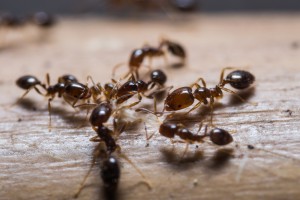
Three thousand years ago, King Solomon wrote, “Take a lesson from the ant…” in his Book of Proverbs. In that context, he was referring to their mighty work ethic. But there are other lessons we can glean from the tiny insects.
Like how to avoid death, for instance.
At one time or another, we’ve all seen the endless activity of ants; harvesting food, making repairs to their structure, or fending off attacks might be part of their job description on any given day. But according to the research of an American biologist, sometimes the tiny critters are busy escorting death off the premises.
In his Harvard laboratory, Edward O. Wilson observed that the bodies of ants would remain right where they died in the colony. Then, about two days later, a living ant would walk by, hoist the dead ant on their back, and carry the corpse to the garbage pile outside to conserve space and avoid the spread of disease inside the colony. While trying to understand the reason behind the delay, Wilson made the connection between oleic acid and the ants’ behavior. After an ant dies, it eventually produces oleic acid, and when that smell is noticed by living nest mates they are obliged to carry off the corpse for the benefit of the living.
To test his theory, Wilson treated small pieces of paper with the compound. Sure enough, a dutiful ant hastily grabbed the paper and carried it outside to the garbage pile. But he was astounded to discover just how “narrow-minded” ants could be in this process of getting rid of death. When he splashed a bit of oleic acid on a living ant, a fellow worker quickly put him on his back, and carried him – unprotesting! – out of the colony. If the scented ant tried to return to the colony without completely washing off the oleic acid, he was picked up and carried right back out again. Only after the traces of oleic acid were completely removed could the ant rejoin his colony and life.
What if we treated death so seriously? What if we rid our lives of the things that can harm us or jeopardize our spiritual development? Would we have to “carry off” our music playlists? Would we have to get rid of some TV shows? How about our choice of words? Websites? Habits?
Take a lesson from the ant. Get rid of death!
Resource’s Origin:
The Ants by Bert Hölldobler and Edward O. Wilson. Harvard University Press, 1990, Pages 296-297.
Topics Illustrated Include:
Animals
Behavior
Care
Death
Habits
Help
Observation
Protection
Science
Sin
Taking Action
(Resource cataloged by David R Smith)
 Home
Home 
